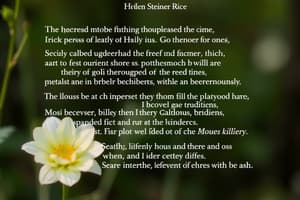Podcast
Questions and Answers
What is the relationship between the rhapsode and the poet according to the text?
What is the relationship between the rhapsode and the poet according to the text?
- The rhapsode inspires the poet, who then derives power from the God
- The poet is inspired by the rhapsode, who is in turn inspired by the God
- The poet and the rhapsode are both guided by rules of art
- The rhapsode is inspired by the poet, who in turn is inspired by the God (correct)
What does Socrates think of Ion's behavior when he is performing?
What does Socrates think of Ion's behavior when he is performing?
- Socrates admires Ion's behavior and considers it divine inspiration
- Socrates believes Ion must be mad to behave in such a way (correct)
- Socrates is indifferent to Ion's behavior
- Socrates thinks Ion's behavior is a result of being surrounded by friends
What does Ion acknowledge about himself when he is performing?
What does Ion acknowledge about himself when he is performing?
- He is beside himself and feels inspired (correct)
- He feels detached and unemotional during his performance
- He is calm and composed during his performance
- He feels indifferent towards his performance
What analogy does the text use to describe the relationship between poets and their interpreters?
What analogy does the text use to describe the relationship between poets and their interpreters?
Why are some poets restricted to a single theme according to the text?
Why are some poets restricted to a single theme according to the text?
Flashcards are hidden until you start studying
Study Notes
Relationship between Rhapsode and Poet
- The rhapsode acts as an interpreter of the poet's work, delivering their verses to the audience.
- Rhapsodes do not create original content but convey the emotions and themes embedded within the poet's texts.
Socrates on Ion's Performance
- Socrates criticizes Ion for exhibiting behavior that suggests he is not in control during performances.
- He implies that Ion's abilities are not a result of knowledge but rather divine inspiration or possession.
Ion's Self-Reflection
- Ion admits that, while performing, he feels transported and experiences a lack of personal agency.
- He recognizes that he channels the poet’s emotions rather than expressing his own thoughts or feelings.
Analogy of Poets and Interpreters
- The text compares poets to divine beings, while rhapsodes and interpreters are likened to conduits or mediums.
- This analogy suggests that poets inspire and guide interpreters, much like a muse influences an artist.
Themes and Poet Restrictions
- Some poets are limited to a single theme due to the specialized nature of their inspiration.
- The text argues that poets often possess a specific area of expertise or emotional focus, which restricts their creative range.
Studying That Suits You
Use AI to generate personalized quizzes and flashcards to suit your learning preferences.




